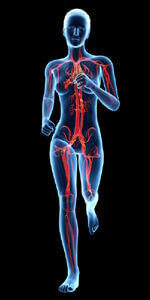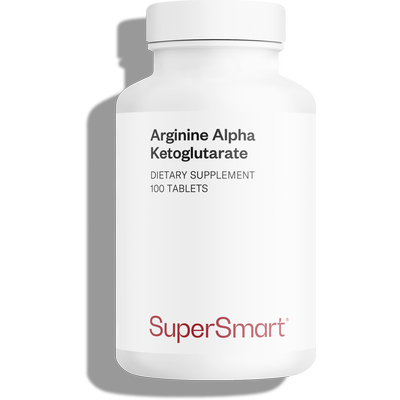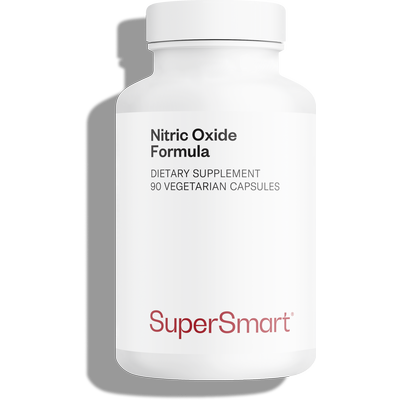09-09-2016
This simple amino acid provides valuable protection for your heart and blood vessels
 Cardiovascular diseases are the no. 1 cause of death globally [1].
Cardiovascular diseases are the no. 1 cause of death globally [1].
According to the WHO, they are responsible for around a third of all deaths - from heart attacks, angina pectoris, stroke, hypertension ...
What makes these diseases so deadly is not just that they affect vital organs but also that they are frequently diagnosed too late or by chance in people who appear to be in good health.
Taking measures to safeguard and strengthen your cardiovascular system as effectively - and as soon - as possible, is therefore essential.
Arginine - a simple amino acid with a complex mechanism of action that protects the heart and blood vessels - can help you do just that.
Can a gas found in exhaust fumes really benefit the blood vessels?
For optimal health, the vital components of the cardiovascular system - the heart, blood, arteries, veins and capillaries - all need to work together efficiently.
Blood flow is key to ensuring this complex system functions as well as possible.
The heart is the body’s engine and the blood a kind of nutritious fuel that feeds the vital organs and ensures they have the means to function properly.
In order for the blood to circulate throughout the body freely, without obstruction and at the correct rate, blood vessels must be sufficiently dilated or open.
In 1998, three American scientists, Robert F. Furchgott, Louis J. Ignarro, and Ferid Murad, were awarded the Nobel Prize for Medicine for discovering how blood vessels stay sufficiently dilated to allow healthy blood flow [2].
In particular, they showed how the endothelial cells that line blood vessel walls naturally produce nitric oxide.
Nitric oxide is a gas that helps keep blood vessels properly dilated and thus plays a key role in ensuring the fluidity of blood flow.
Their discovery was greeted with astonishment among the scientific community at the time since nitric oxide was primarily known as an atmospheric pollutant generated when nitrogen burns – as in car exhaust fumes.
However, the nitric oxide produced by the body has nothing to do the damaging effects of exhaust fumes.
Quite the opposite, in fact.
In facilitating efficient blood flow, the nitric oxide produced by the body is actually essential to the health of the cardiovascular system.
Arginine : the key to healthy dilation of the blood vessels
The body therefore needs to produce enough nitric oxide to keep the blood vessels well-dilated and so maintain the health of the heart, arteries and all the vital organs that make up the cardiovascular system.
This is where arginine comes in - an amino acid first isolated towards the end of the 19th century, but only recognised for its beneficial role in the cardiovascular system with the Nobel Prize-winning discoveries of the above-mentioned scientists in 1998.
Arginine was identified as the precursor molecule of nitric oxide which is made from the enzymatic decomposition of arginine.
Arginine is therefore the raw material of nitric oxide.
If you are deficient in arginine, the ability of your endothelial cells to produce sufficient nitric oxide is reduced, which in turn leads to narrowing of the blood vessels.
Your blood flow to vital organs will be severely impeded causing all kinds of disruptions to the cardiovascular system and increasing your risk of disease.
In 2004, the Journal of Nutrition de l'American Society for Nutritional Sciences conducted a large-scale review of scientific studies on arginine and the importance of its role [3].
This review confirmed arginine’s properties in relation to maintaining a healthy cardiovascular system.
It demonstrated that arginine :
-
• increases blood vessel vitality,
• plays an essential role in maintaining the health of the vascular endothelium (vessel walls),
• promotes dilation of the blood vessels and nitric oxide production generated by the vascular endothelium.
As with so many of the body’s functions, arginine’s activity tends to decline with age leading to a reduction in natural production of nitric oxide, thus compromising the cardiovascular system as a whole.
As you get older, regardless of your general state of health, it is therefore essential to increase your arginine levels in order to safeguard and strengthen your cardiovascular system.
How to increase your arginine
In order to increase your arginine levels, you can up your intake of foods rich in this amino acid : red meat, poultry, fish, legumes, brown rice, oats, buckwheat and nuts. However, even with a high-arginine diet, it is difficult to know how much of the amino acid your body is actually absorbing, since it is metabolised and eliminated very rapidly.
Hence the availability of a number of arginine supplements that can help maintain high enough arginine levels to benefit the cardiovascular system. Taking arginine in supplement form means the body can easily absorb the necessary doses demonstrated by scientific research - between 500mg and 1500mg a day.
If possible, I recommend spreading your daily supplement over three doses - for example, one 500mg capsule morning, midday and evening, to give you a total of 1500mg a day.
In this way, you can prolong arginine’s effects and increase its ability to protect you against cardiovascular diseases by:
-
• dilating your blood vessels,
• improving your blood flow,
• maintaining your blood pressure within the recommended levels,
• boosting your whole immune system.
There are no particular contraindications or unwelcome side-effects at this dose.
If you are already receiving treatment for cardiovascular problems, it is important you consult your doctor before starting any arginine therapy.
PS : Arginine is also used increasingly to treat sexual dysfunction in men and women [5].
By dilating blood vessels, nitric oxide promotes the blood flow necessary for an erection. In a study of men with erectile problems and low levels of nitric oxide, supplementing with 5g of arginine a day increased nitric oxide levels and improvements in the quality of erection were observed.
Another study suggests arginine may also have a libido-stimulant effect in menopausal women.
These encouraging, albeit limited, results may be linked to the effect of arginine and nitric oxide in improving blood flow to the sex organs. Further studies are, however, needed to substantiate the benefits of arginine in treating sexual dysfunction.
Sources :
[1] Maladies cardio-vasculaires
[2] Endothelium-Derived Relaxing Factor: Discovery, Early Studies, and Identification as Nitric Oxide
[3] J. Nutr. October 1, 2004 vol. 134 no. 10 2748S-2751S
[4] Moriguti JC, Ferriolli E, et al. Effects of arginine supplementation on the humoral and innate immune response of older people. Eur J Clin Nutr. 2005 Dec;59(12):1362-6.
Provinciali M, Montenovo A, et al.Effect of zinc or zinc plus arginine supplementation on antibody titre and lymphocyte subsets after influenza vaccination in elderly subjects: a randomized controlled trial. Age Ageing. 1998 Nov;27(6):715-22.
[5] Chen J, Wollman Y, et al. Effect of oral administration of high-dose nitric oxide donor L-arginine in men with organic erectile dysfunction: results of a double-blind, randomized, placebo-controlled study.BJU Int. 1999 Feb;83(3):269-73.
Klotz T, Mathers MJ, et al. Effectiveness of oral L-arginine in first-line treatment of erectile dysfunction in a controlled crossover study.Urol Int. 1999;63(4):220-3. Meston CM, Worcel M. The effects of yohimbine plus L-arginine glutamate on sexual arousal in postmenopausal women with sexual arousal disorder.Arch Sex Behav. 2002 Aug; 31(4): 323-32.
Order the nutrients mentioned in this article

Improved form of arginine with higher bioavailability
www.supersmart.com
A major supplement for cardiovascular health, sexual function and immunity
www.supersmart.com© 1997-2025 Fondation pour le Libre Choix
All rights reserved
All rights reserved
Free
Thank you for visiting our site. Before you go
REGISTER WITHClub SuperSmart
And take advantage
of exclusive benefits:
of exclusive benefits:
- Free: our weekly science-based newsletter "Nutranews"
- Special offers for club members only














